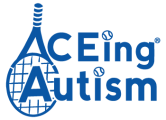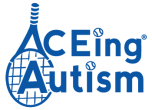Late this summer, Vania King, who grew up in Long Beach, talked about returning to the tour, saying, “I have been practicing for about four months now. I am going to play three tournaments before the US Open. My shoulder has been an issue since I started back, but the reason I originally stopped was due to a herniated disc in my neck.”
While sidelined, the 2010 Wimbledon and US Open doubles winner, with Yaroslava Shvedova of Kazakhstan, naturally concentrated on rehabilitating her injuries. She also had time to discover and explore during her court down time. “I first heard of ACEing Autism through a Facebook post that Richard (Spurling, along with his wife Shafali Spurling Jeste, the company founders) had put on Tarik’s (Benhabiles, her coach) page about a new program starting in Boca Raton,” King said. “This was about a year and a half ago. At the time, I was taking a seminar on Autism at the University of Massachusetts, Lowell, so the program piqued my interest and I reached out to Richard about helping.”
In 2008, Spurling and Jeste, who are now Southern California residents, began a play-based tennis program for youngsters on the East Coast. Called ACEing Autism, it received the USTA’s 2014 Adaptive Tennis Community Service Award at the Tennis Development Workshop held last November at the Sheraton Atlanta Hotel.
King’s course requirements included taking a seminar class, as she explained, “I chose one that was titled Clinical Psychology. I thought the class would give me a better idea of how psychologists treat their patients. However, each professor decided whether they wanted to focus on a specific psychological disorder/aspect. My professor chose to focus solely on autism and more specifically, behavioral intervention in autism.”
Her travel schedule made it difficult to find time to get involved with ACEing Autism, but King finally found a way. “I eventually volunteered at the ACEing Autism Help Group in Los Angeles and the one at South High School in Torrance,” she said. “After helping, I agreed to become an ambassador for the program. Not only did I really enjoy participating, I saw the enthusiasm and benefit the kids got from taking part. I thought it would be terrific if I could bring it to my hometown of Long Beach, since we have such a large population and Autistic Spectrum Disorder (ASD) has become more and more prevalent.”
She set about finding a home for her program. “I decided to reach out to high schools in my area,” she said. “Jordan High School was willing to host it because my old Poly High Principal had moved there, but when I got an OK from Poly, I knew I had to do it there, since not only did I go there, but all my siblings (Phillip, Ivana and Mindy) did as well, and we have a lot of ties at the school.”
King added, “This is the longest I’ve been out (away from the tour). I’ve never been out for more than a few weeks before. It was a really nice change though. I can appreciate the difference between the life of a tennis player and a non-tennis player. Stopping playing allowed me to pursue other interests, like this non-profit organization and other charities, as well as dabbling in some substitute teaching in the education field.”
Beginning September 19th, King is organizing a clinic that will take place every Saturday morning for six weeks at Long Beach Poly, 1600 Atlantic Avenue. Those younger than ten-years-old will be on court from 9:00-10:00 am. Those over ten will be active between 10:00 and 11:00 am.




